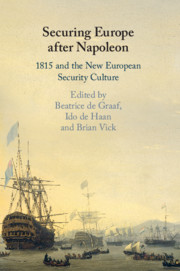Book contents
- Securing Europe after Napoleon
- Securing Europe after Napoleon
- Copyright page
- Contents
- Contributors
- Vienna 1815
- Part I Conceptualisations
- Part II Institutions and Interests
- Part III Threats
- Part IV Agents and Practices
- 13 Friedrich von Gentz and His Wallachian Correspondents
- 14 Diplomats as Power Brokers
- 15 Economic Insecurity, ‘Securities’ and a European Security Culture after the Napoleonic Wars
- Index
13 - Friedrich von Gentz and His Wallachian Correspondents
Security Concerns in a Southeastern European Borderland (1812–28)
from Part IV - Agents and Practices
Published online by Cambridge University Press: 25 January 2019
- Securing Europe after Napoleon
- Securing Europe after Napoleon
- Copyright page
- Contents
- Contributors
- Vienna 1815
- Part I Conceptualisations
- Part II Institutions and Interests
- Part III Threats
- Part IV Agents and Practices
- 13 Friedrich von Gentz and His Wallachian Correspondents
- 14 Diplomats as Power Brokers
- 15 Economic Insecurity, ‘Securities’ and a European Security Culture after the Napoleonic Wars
- Index
Summary
Between 1812 and 1828 Friedrich von Gentz acted as political correspondent for three successive princes of Wallachia. This chapter reveals the complex relationship between the freelance diplomat and his generous clients, in which Gentz acted as an unofficial diplomatic agent, confidant and tutor, thereby engaging in a process of ‘distance social teaching’ in relation to his princely correspondents, who themselves were ‘intelligence brokers’ in Europe’s southeastern periphery. In turn, the hospodars kept Gentz regularly updated on the Danubian principalities' political situation, and appealed to Gentz’s expertise for guidance in the diplomatic conflict between Russia and the Ottoman Empire, in which ambassadorial conferences worked for the cooperative management and resolution of international crises. The relationship between Gentz and his Wallachian correspondents provides a telling example of a practice that disseminated to southeastern Europe a new political and security culture.
Keywords
- Type
- Chapter
- Information
- Securing Europe after Napoleon1815 and the New European Security Culture, pp. 251 - 270Publisher: Cambridge University PressPrint publication year: 2019

